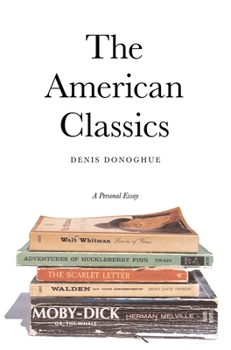The American Classics: A Personal Essay
Select Format
Select Condition 
Book Overview
An eminent liteary critic enumerates and explores five American classics How is a classic book to be defined? How much time must elapse before a work may be judged a "classic"? And among all the works... This description may be from another edition of this product.
Format:Hardcover
Language:English
ISBN:0300107811
ISBN13:9780300107814
Release Date:May 2005
Publisher:Yale University Press
Length:304 Pages
Weight:1.05 lbs.
Dimensions:1.1" x 5.8" x 8.5"
Customer Reviews
1 rating
Similar to Lawrence's Studies in Classic American Literature
Published by Thriftbooks.com User , 18 years ago
Donoghue doesn't very much care for these 5 central books in the US canon: Walden, Huck Finn, Scarlet Letter, Leaves of Grass and Moby Dick. He correctly finds in them, without explicitly citing Lawrence, that they are all essentially books about solitary, hyper-individualists, "cold, isolate, stoic, alone- a killer," as Lawrence labeled the American soul. Like Bloom, whom he doesn't appear to like, Donoghue correctly puts Emerson as the sagacious center of the American literary tradition. The problem being that, for Donoghue, that has doomed American culture to a spirit of excessive individualism and a rejection of the value of community. Donoghue then explicitly criticizes American society for its bellicosity, pomposity and ignorance during the current Bush II administration. It is interesting to read a critic who is unafraid of bringing political issues into his work. Most dance around such questions or avoid them altogether, though even in its absence, the political is always found within works of human artifice, as thinkers such as Frederic Jameson and Edward Said have made so clear in their work. Essentially, Donoghue is correct in his assessment of these central American works. THey are excessively individualistic, often naive, and quite indicative of a society that, at least at the time of their having been written, was likely incapable of any literature more profound. Like many persons critical of American lit, Donophue does evince a fondness for Henry James, who was undoubtedly a very sophisticated writer; the problem is, very few people actually read him today, and so James does not provide much of a corrective against the Emersonion individualist vision. One slight problem I have with the book is that Donoghue does not more explicitly address his essentially Catholic viewpoint. Some of the writers that he cites as more mature than these Americans are Joyce, Greene and Eliot, Catholics all. THe problem with the AMerican/ Emersonian line is that is quite the opposite; it is a tradition far more radically "protestant," and this is a central issue for Bloom in his work on AMerican writers. Thus the unstated but clear theme of Donoguhue's book is that he dislikes these American books because they do not participate in the world view that would be found in the works of more Catholic/ European writers. There is nothing wrong with Donoghue feeling this way; its a matter of taste. I am probably not in disagreement with him. But I think it would have deepened his analysis in this book had he more explicity recognized the difference in religious sensibilities between the European tradition which he enjoys and the American, "hyper-individualist" tradition of which he is so critical. Interesting to me also that Donoghue does not comment upon the work of Wendell Berry, an American who does indeed write as a part of the Catholic tradition, whatever that might actually mean, and is unfortunately not widely read in the US as he i






